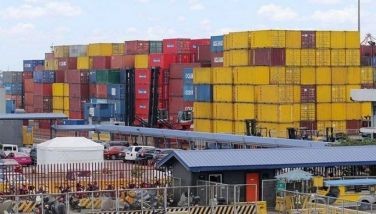Bangko Sentral names BDO as top commercial bank
MANILA, Philippines - As the country’s top remittance bank in 2008, Banco de Oro (BDO) of the SM Group was named by the Bangko Sentral ng Pilipinas (BSP) as this year’s Top Commercial Bank during the Annual BSP Stakeholders’ Awards.
BSP records show that BDO took over as the country’s top remittance bank following its merger with Equitable PCI Bank which was also one of the country’s biggest remittance banks. BDO cornered 26 percent of the remittance business in 2008.
In the 2008 list, BDO was followed by the Ayala-owned Bank of the Philippine Islands (BPI) with its 22.89-percent share. The previous year, BPI was the top remittance bank with a 22.01-percent share of total remittance inflows.
The shake-up in standings also unseated Philippine National Bank (PNB) which was 2007’s second place with 18.52 of total remittance inflows that year. In 2008, PNB’s share dropped to 16.06 percent as it fell into third place.
In fourth place was Metropolitan Bank and Trust Co., also last year’s fourth biggest remittance bank. MBTC was steady, however, increasing its market share from 12.87 percent in 2007 to 13.54 percent in 2008.
PNB had commanded a huge lead in the remittance business for years, its market share peaking at about 40 percent of the business before tapering off to 25 percent in 2005.
However, BPI, a relative newcomer in the remittance business, took over the larger share of the market in 2007 with aggressive positioning and product offers that attracted more overseas Filipino workers.
This year, BDO took over BPI as banks competed for remittances by offering various products and reducing remittance costs to overseas Filipinos sending money home.
Commercial banks have been engaged in a cut-throat competition over the $16-billion
remittance business from over 12 million workers deployed abroad and regularly sending money home to their families.
Bangko Sentral ng Pilipinas (BSP) Governor Amando M. Tetangco Jr. said remittances from overseas Filipinos would continue to grow this year as the Arroyo administration pushes for bilateral agreements for the deployment of more workers abroad.
The consensus projection made by private analysts since the beginning of the year indicates that remittances are generally expected to decline by as much as 20 percent this year as the global economy struggles to prevent job losses.
Even the National Government said it expected remittances to do not better than match last year’s inflow of $16.4 billion.
On the other hand, Market Call Research of First Metro Investment Corp. and the University of Asia and the Pacific expect remittances to be sustainable despite the lingering global economic crisis.
Remittances actually continued to grow, albeit slowly, rising by 2.2 percent in April, following a 3.1-percent growth in March.
“Even so, it can also be observed that OFW remittances for the first four months of the year now stands at $5.5 billion, up by 2.6 percent from last year’s levels,” the report noted.
The report said inflows are steady and despite the minimal growth rate, it is still on track. “It is defying consensus that OFW remittances will register significant negative growth this year,” the report said.
“Sustained demand for our migrant workers in different countries continues to help keep up these inflows of OFW remittances,” Market Call said.
“Moreover, with the government’s employment deals with several countries in need of our workers - the risks from the continuing global economic recession affecting the remittances are being tempered,” the report added.
The research report cited the Japan-Philippines Economic Partnership Agreement (JPEPA) which led to the deployment of an additional 273 health workers to Japan. More importantly, the initial adverse trends in labor deployment have also shifted.
“Even the rise in retrenchments of OFWs has abated,” the report said.
In peso terms, the Market Call report said the small 2.2-percent growth of OFW remittances in April translated to a huge 17.9 percent growth. However this rate was below the 20-percent mark, indicating a slowdown.
The Market Call Report said the slowdown resulted not only from the deceleration in the growth of remittances in dollar terms but also from the half-percent appreciation of the peso in March to April.
- Latest
- Trending




























